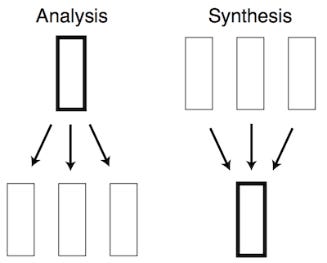Thinking Systematically and Systemically
The balance between dividing a system into individual parts and viewing it as a whole
At a glance, it is easy to confuse the difference between systematic and systemic, but this is an important difference between two different perspectives that need to be brought together as we use systems to understand reality (aka Systems Thinking). Looking back into history can help us appreciate the evolution of this difference, helping us incorporate it into our systems thinking practice.
Starting with the definitions:
systematic
done or acting according to a fixed plan or system; methodical.
"a systematic search of the whole city"
systemic
relating to a system, especially as opposed to a particular part.
"the disease is localized rather than systemic"
We can see the difference between dividing a system into parts (systematic) and considering it as a unified whole (systemic).
The Origins of the System
The world is big, messy and hard to understand. Back in the 16th century, Descartes thought that the best way to deal with this was:
"to divide each of the difficulties under examination into as many parts as possible, and as might be necessary for its adequate solution problems by progressively dividing them into smaller parts and examining them to understand the whole". - Descarte
The origins of the word systematic can also traced to around this time. With this systematic approach, he helped kick off a couple of hundred years of developments in science, industry and colonisation. By the 19th century, progress in biology tested the limits of this systematic approach of breaking up a problem into smaller parts with an appreciation of the systemic nature of cells when they came together as organisms, where the whole was greater than the sum of the parts. While it is possible to explain the behaviour of a steam engine by systematically understanding the parts, the same does not apply to the behaviour of a frog. Around this time, we also see the word systemic appear.


Bringing it back together again
From this, the field of systems thinking evolved, appreciating not only the systematic dissection of the world into parts and the relationship between those parts but also the systemic behaviour that emerges from parts and interactions.
This parallels the (systematic) process of analysis and the (systemic) process of synthesis (systemic). Those of us coming from engineering and technology are often both good and predisposed to analysis. However, we must be careful, as how we have systematically analysed a system will bias how we might systemically synthesise our understanding of it. The whole can also be more than the sum of its parts.
Going fast or going far
Thinking systematically or systemically are both valuable approaches for understanding and solving problems. When facing problems, it is useful to break the situation down into smaller parts to solve separately, especially when we follow a systematic approach which can easily be understood by all involved. We do this whenever we scope a project into different activities which can be delegated. But we need to keep a systemic perspective to make sure that these parts can come back together.
Each approach has its value, with parallels in this proverb:
“If you want to go fast, go alone; if you want to go far, go together”
- Proverb
The next post will explore how our systematic perspective and approach can influence our systemic understanding and how we can be aware of this bias.
Picture Credits




